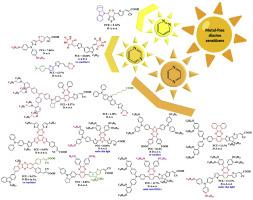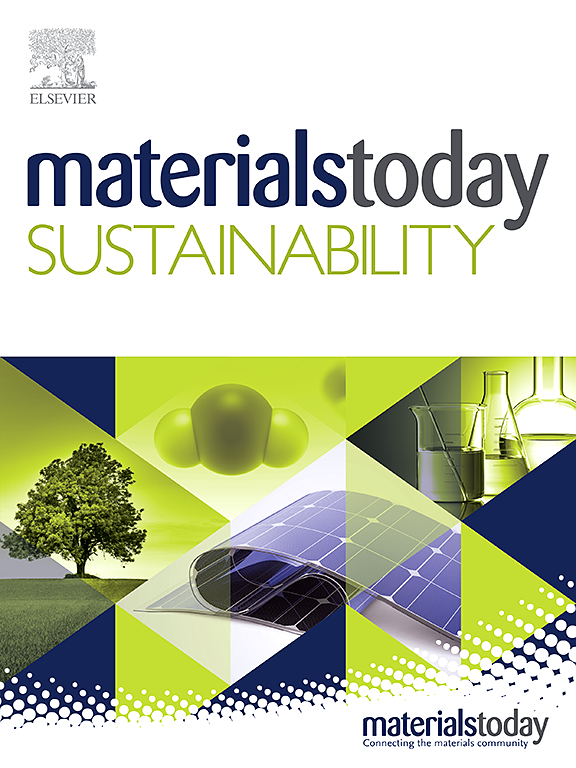用于染料敏化太阳能电池的无金属重氮染料概述:合成、光学和光伏特性
IF 7.1
3区 材料科学
Q1 GREEN & SUSTAINABLE SCIENCE & TECHNOLOGY
引用次数: 0
摘要
全球能源使用量的持续增长已经耗尽了化石燃料储备。因此,出于对无限能源的需求,研究人员探索将太阳能作为替代能源储备。特别是染料敏化太阳能电池(DSSC),作为一种利用太阳能的低成本、环保型光伏技术,在满足日益增长的可再生能源供应需求方面大有可为。敏化剂分子工程对于实现高转换效率至关重要。在众多不同类型的敏化剂中,重氮类支架(取代重氮类、苯并二氮类和融合杂环重氮类)因其在可见光区域具有较强的吸收带、电子吸收能力以及骨架易于改性等特点而成为研究的重点。本综述根据重氮类化合物的支架(哒嗪、嘧啶、吡嗪)对其进行了分类。讨论了根据敏化剂的分子工程改善无金属 DSSC 性能的问题。讨论了敏化剂分子中的供体、辅助供体、辅助受体、单锚定基团或双锚定基团以及π-间距或烷基链对光伏性能的影响。还总结了合成方法、溶液中的光学特性及其在 DSSC 中的光伏性能。本研究旨在让读者对这一主题有一个清晰的认识,并启发研究人员在今后设计敏化剂时采用其他具有缺电子特性的杂环支架,以实现出色的太阳能转换。本文章由计算机程序翻译,如有差异,请以英文原文为准。

An overview of metal-free diazine-based dyes for dye-sensitized solar cells: Synthesis, optical, and photovoltaic properties
The constant rise in global energy usage has depleted fossil fuel reserves. Therefore, researchers explored solar energy as an alternative energy reserve due to the need for limitless power. In particular, dye-sensitized solar cells (DSSCs) hold great promise in meeting the growing demand for renewable energy supplies due to a low-cost and environmentally friendly photovoltaic technology for harnessing solar energy. The sensitizers' molecular engineering is essential for accomplishing high conversion efficiencies. Numerous research activities have been concentrated on diazine scaffolds (substituted diazines, benzodiazines, and fused heterocyclic diazines) among the many different types of sensitizers because of their strong absorption bands in the visible light region, electron-withdrawing ability, and the ease of modifications that can be made to their skeleton. This review classified the diazines according to their scaffolds (pyridazine, pyrimidine, pyrazine). The improvements to the performance of metal-free DSSCs according to the molecular engineering of the sensitizer are discussed. The effect of the donors, auxiliary donors, auxiliary acceptors, mono or di-anchoring groups, and incorporation of π-spacers or alkyl chains in the sensitizer molecule on the photovoltaic performance are discussed. The synthetic approaches, optical properties in solution, and their photovoltaic performances in DSSCs were also summarized. The present work aims to give readers a distinct picture of the subject and enlighten the researchers by developing future ideas about designing sensitizers employing other heterocyclic scaffolds with electron-deficient properties to achieve an excellent solar energy conversion.
求助全文
通过发布文献求助,成功后即可免费获取论文全文。
去求助
来源期刊

Materials Today Sustainability
Multiple-
CiteScore
5.80
自引率
6.40%
发文量
174
审稿时长
32 days
期刊介绍:
Materials Today Sustainability is a multi-disciplinary journal covering all aspects of sustainability through materials science.
With a rapidly increasing population with growing demands, materials science has emerged as a critical discipline toward protecting of the environment and ensuring the long term survival of future generations.
 求助内容:
求助内容: 应助结果提醒方式:
应助结果提醒方式:


